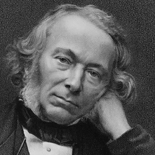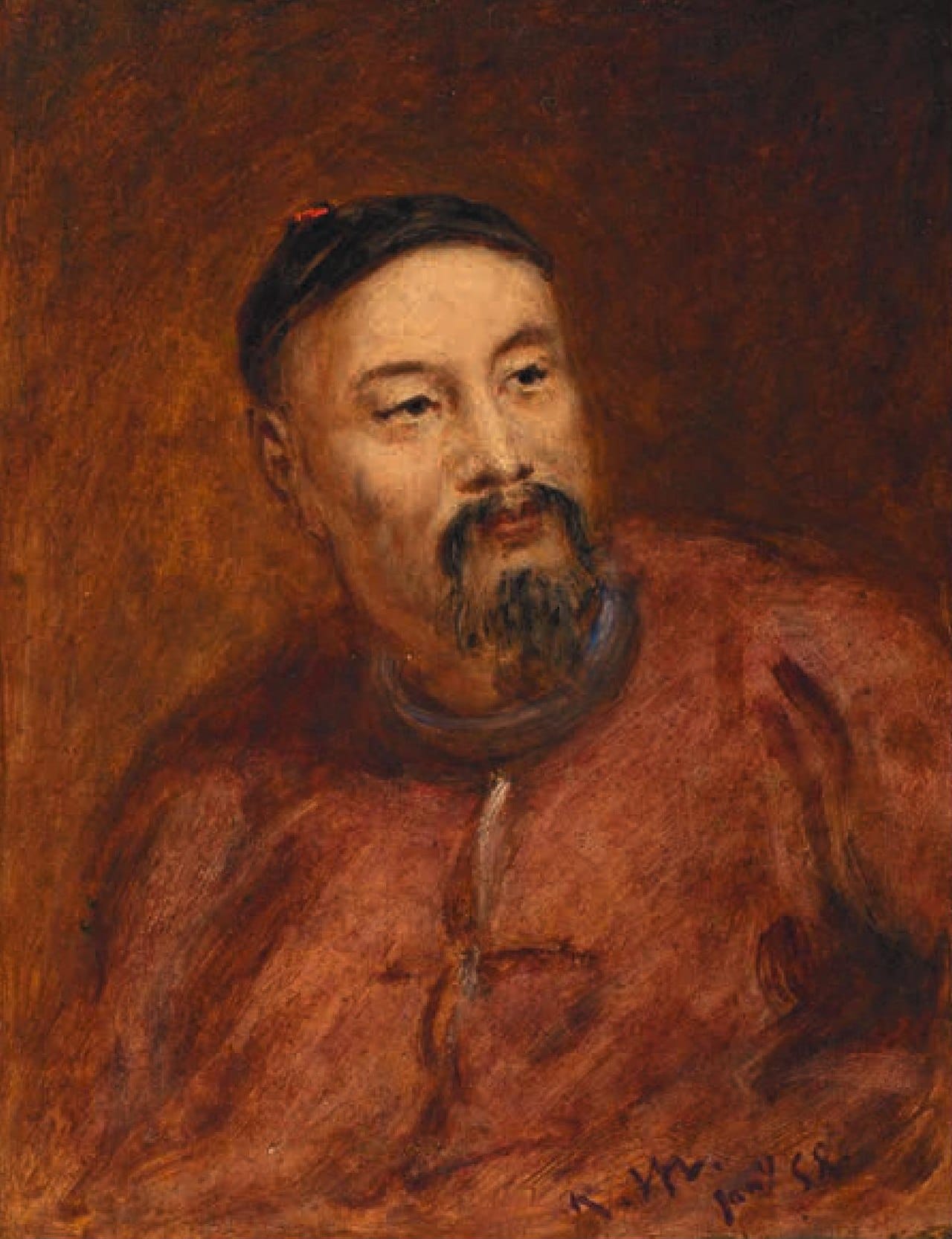Continued from
Part 1
They are the very soul of commerce in the East. You find them carrying on their industry in foreign countries with that assiduity and laboriousness which characterise the Scotch and the Swiss.
You find them not as barbarians at home, where they cultivate all the arts and sciences, and where they have carried all, except one, to a point of perfection but little below our own — but that one is war. You have there a people who have carried agriculture to such a state as to become horticulture, and whose great cities rival in population those of the Western world. There must be something in such a people deserving of respect. If, in speaking of them, we stigmatise them as barbarians, and threaten them with force because we say they are inaccessible to reason, it must be because we do not understand them; because their ways are not our ways, nor our ways theirs. Is not so venerable an empire as that deserving of some sympathy — at least of some justice — at the hands of conservative England? To the representatives of the people in this House I commend this question, with full confidence that they will do justice to that people.
By
Richard Cobden
1804-1865
Questions for Critics
1. What is the author
aiming to achieve in writing this?
2. Note any words, devices or turns of phrase that
strike you. How do they help the author communicate his
ideas more effectively?
3. What impression does this passage make on you?
How might you put that impression into words?
Based on The English Critic (1939)
by NL Clay, drawing on The New Criticism: A Lecture Delivered at
Columbia University, March 9, 1910, by J. E. Spingarn,
Professor of Comparative Literature in Columbia University,
USA.
Précis
The Chinese, he went on, were as civilised at home as they were abroad, and it was no shame that they lagged behind us only in our fondness for war. To think so little of so mighty a people was surprising in a country that valued its own heritage as much as England, and must come from ignorance or pride.
(60 / 60 words)
The Chinese, he went on, were as civilised at home as they were abroad, and it was no shame that they lagged behind us only in our fondness for war. To think so little of so mighty a people was surprising in a country that valued its own heritage as much as England, and must come from ignorance or pride.
Edit
|
Reset
Variations:
1.increase the length of this precis to exactly 65 words.
2.reduce the length of this precis to exactly 55 words.
3.introduce one of the following words into the precis: about, because, despite, if, just, ought, whereas, who.
About the Author

Richard Cobden (1804-1865) was the son of a bankrupt Sussex farmer. By a mixture of talent and audacity, Richard rose from sweeping his uncle’s warehouse floor to become a Manchester mill-owner and then Liberal Party MP for Rochdale in Lancashire. He came to prominence in the late 1830s as a vocal critic of London’s panicky and greedy policies towards Russia and later China. Soon afterwards, he emerged as the leader of the Parliamentary rebellion against economic protectionism, i.e. the policy of using sanctions and trade tariffs to ring-fence the profits of domestic corporations and cripple the economies of foreign countries. The Corn Laws, the flagship protectionist policy that had brought thousands close to starvation, were repealed in 1846. The campaign almost ruined him financially, but he recovered and his final triumph was the Cobden-Chevalier Treaty of 1860, a landmark free-trade agreement between Britain and France which put centuries of mistrust behind us. Richard married Catherine Anne Williams, from Wales, in 1840 and they brought up five daughters together.
Archive
Word Games
For each group of words, compose a sentence that uses all three. You can use any form of the word: for example, cat → cats, go → went, or quick → quickly, though neigh → neighbour is stretching it a bit.
This exercise uses words found in the accompanying passage.
1
Silk.
Western.
World.
2
According.
Only.
Question.
3
Barbarian.
Full.
Speak.
Variations:
1.
include direct and indirect speech
2.
include one or more of these words: although, because, despite, either/or, if, unless, until, when, whether, which, who
3.
use negatives (not, isn’t, neither/nor, never, nobody etc.)
Suggest words or phrases that seem opposite in meaning to each of the words below. We have suggested some possible answers; see if you can find any others.
This exercise uses words found in the accompanying passage.
1.
Confidence.
2.
Deserved.
3.
Except.
4.
Full.
5.
Great.
6.
Increase.
7.
Laborious.
8.
Supply.
9.
Understand.
Show Useful Words (A-Z order)
Decrease.
Demand.
Doubt.
Effortless.
Empty.
Including.
Misunderstand.
Small.
Uncertainty.
Undeserved.
Variations:
1.instead of opposites, suggest words of similar meaning (synonyms).
2.use a word and its opposite in the same sentence.
3.suggest any 5 opposites formed by adding -less.
Use each word below in two sentences, first as the subject of a verb, and then as the object of a verb. It doesn’t have to be the same verb: some verbs can’t be paired with an object (e.g. arrive, happen), so watch out for these.
This exercise uses words found in the accompanying passage.
1.
City.
2.
Home.
3.
Respect.
4.
Population.
5.
Time.
6.
Great.
7.
Hand.
8.
History.
9.
Place.
Variations:
1.use your noun in the plural (e.g. cat → cats), if possible.
2.give one of your sentences a future aspect (e.g. will, going to).
3.write sentences using negatives such as not, neither, nobody and never.
Make words by adding vowels to each group of consonants below. You may add as many vowels as you like before, between or after the consonants, but you may not add any consonants or change the order of those you have been given. See if you can beat our target of common words.
gnts
(5)
See Words
agents.
gents.
giants.
gnats.
ignites.
Post Box
: Help Available
You are welcome to share your creativity with me,
or ask for help with any of the
exercises on Clay Lane. Write to me at this address:
nicholas@claylane.uk
See more at Post Box.
If you like what I’m doing here on Clay Lane,
from time to time you could
buy me a coffee.
Buy Me a
Coffee is a crowdfunding website, used by over a million people. It is designed
to help content creators like me make a living from their work. ‘Buy Me a
Coffee’ prides itself on its security, and
there is no need to register.

Related Posts
Bullies to the Weak, Cowards to the Strong
By
Richard Cobden
Richard Cobden wanted to know why British policy towards China was so different to our policy towards the USA and European powers.
Read
Picture: By William Daniell (1769-1837), via Wikimedia Commons. Licence: Public domain..
Source.
Posted
June 20 2023
‘Nobody Wants to Invade You’
By
Richard Cobden
Richard Cobden told an Edinburgh peace conference that the biggest
threat to the United Kingdom’s security was her own foreign policy.
Read
Picture: By Ary Scheffer (1795-1858), via Wikimedia Commons. Licence: Public domain..
Source.
Posted
July 14 2022
Naked Aggression
By
Richard Cobden
Richard Cobden told his audience in the London Tavern that however much
sabre-rattling was heard in St Petersburg, the average Russian was a man of peace.
Read
Picture: © Azanulbizar74, Wikimedia Commons. Licence: Public domain..
Source.
Posted
August 5 2021
Misreading Russia
By
Richard Cobden
Richard Cobden asked Parliament to make a better effort to understand the Russian mindset.
Read
Picture: © Rost.galis, Wikimedia Commons. Licence: CC BY-SA 4.0..
Source.
Posted
April 6 2018







